- Home
- Allison Brennan
The Lost Girls Page 2
The Lost Girls Read online
Page 2
Siobhan tried to put Mrs. Hernandez out of her mind and once again turned her attention across the road. There were no streetlights anywhere she could see; if she couldn’t get a good photo of someone in the next thirty minutes, she’d have to leave even if Mrs. Hernandez didn’t kick her out first. She could only do so much without a flash.
A car was coming down the broken street, headlights on in the dusk. At first Siobhan feared it was Mr. Hernandez, but the black Escalade pulled into the driveway across the roadway.
An Escalade certainly didn’t fit into this neighborhood. The vehicle practically screamed Illegal activity here!
Siobhan zoomed in and clicked several photos of the license plate, then zoomed out and kept shooting as two people emerged from the Escalade: a man in the driver’s seat and a woman in the passenger seat. The man looked like hired help: broad, physically fit, Caucasian, well dressed. Far too well dressed for this neighborhood. The woman was older, wore makeup and a sleek pantsuit. A glitter of jewelry caught Siobhan’s eye, but she was too far away and the lighting too poor for her to make out much detail. The camera, however, would catch it all and she’d go through the images carefully. A black sedan drove up and stopped in front of the house. No one emerged.
The man and woman walked to the back of the house and disappeared from her view. Movement behind the upstairs window caught Siobhan’s eye. She aimed her camera at the house and watched the scene through her telephoto lens: upstairs and downstairs and all around. She silently took pictures, her camera purring in her hands. She wasn’t looking for an artistic shot, she wasn’t framing an image or trying to capture the best lighting. But her skill was natural, born out of the love of film and years of experience, from the moment her father gave her a nearly indestructible point-and-shoot camera when she was five. Now her camera did most of the work. Four thousand dollars—between the camera and the lens she’d chosen for this stealth mission—was a lot of money, but it was worth it. The camera captured license plates. Profiles. Gestures. Clothing and shoes and jewelry and the way people parted their hair. Still, she’d inspect every detail later, because her eye could see things the soulless camera could not.
Then the front door opened. Two goons whom Siobhan suspected had come with the van earlier, before Mrs. Hernandez called, followed by the well-dressed man. The three of them stood on the brown grass, as if waiting.
The curtain moved again and caught Siobhan’s eye. She was shooting before the camera focused. She caught a glimpse of a face, female, then it was gone and she prayed her camera had caught her image, that she could bring out the detail on her computer.
It could be Marisol or Ana. It could be …
Two of the men began to argue in front of the house, but Siobhan couldn’t hear what they said—words lost in space, only the occasional angry curse coming through.
The door opened again and the well-dressed woman came out; this woman was not scared. She was in charge, an older, marginally attractive Hispanic woman with a sleek bun and round cheeks. The men avoided her gaze. She was admonishing them for something—perhaps the argument they were having in public. She raised her hand and another, much younger, woman came out. She was very young, rail-thin, and pale—nearly as pale as Siobhan—with short, dirty-blond hair. She carried a bundle in her arms—a bundle in a white blanket. Siobhan kept taking pictures, but she was distracted by the young girl who was clearly carrying a baby.
Her heart skipped a beat. This couldn’t be Baby Elizabeth. She was safe in Laredo, an hour away. The nurse promised to call Siobhan if anyone came to claim the baby. One of the advantages of having a mother who’d been a nurse was that Siobhan knew the lingo, knew how to get them to help her.
Another baby? Mrs. Hernandez told Father Sebastian she’d seen “many” pregnant women; when pushed, she’d said she’d seen three or four different women, all pregnant. There was no sign that this was a sanctuary for single mothers who needed a helping hand.
Yet it could be.
You really believe that, Siobhan? That these people are helping pregnant women? You’re not that stupid.
“Get out of my head, Kane,” she muttered.
The blonde climbed into the Escalade with the two goons. The older woman walked to the sedan and the driver emerged, opened the rear door for her; she slipped in. The man she’d arrived with walked around to the passenger side, and almost immediately they drove off. A fourth man Siobhan hadn’t seen before came out of the back of the house, opened the driver’s door of the Escalade, and drove off with the goons, girl, and baby.
That left the beat-up van at the house, but six adults and the girl had left. There couldn’t be anyone else inside, could there be?
Siobhan flipped rapidly back through the digital photos until she found the series she’d taken of the window. She vaguely heard a rattling truck on the road and glanced up, but didn’t see anything. She focused again on her camera.
A woman’s face was clear. She wasn’t Marisol or Ana, but she could have been their cousin. Young, not more than twenty. Beautiful, with the same exquisite, almost exotic features. Whiter than most Mexicans, with thick silky hair and almond-shaped eyes. She was definitely from the same region as the de la Rosa sisters.
And she had been crying.
The bedroom door burst open again. “You must go. Now. Enrique is home. Now, now!”
Siobhan quickly packed up her equipment and put her backpack on her back. “Thank you.”
“Go!”
A door opened and closed in the house.
Mrs. Hernandez put her hands to her mouth. She ran out and Siobhan followed. Maybe she could explain to Mr. Hernandez the importance of her work, that she was trying to help …
He stared at Siobhan, angry and worried, the same fear and worry that had been on his wife’s face.
“Who is this?” the man said in rapid Spanish.
“No one,” the woman said. “A friend of Father Sebastian’s.”
“You’re lying to me.” He glared at Siobhan. “Do you know what you do?” In rapid Spanish he said to his wife, “I told you not to say anything, do nothing!” He turned to Siobhan and in broken English said, “You take advantage, this old woman.”
“No, señor, I’m leaving now. I’m sorry.”
“And will you be here when they come for us in the night? When they shoot us in our sleep? When my wife cries as they hurt her? Where will you be? Where will God be?”
He was as scared as he was angry. Siobhan understood him; she understood the fear that made good people look the other way.
Maybe Kane was right and she ran tilting at windmills, ignorant, getting herself and others in trouble; but if not her, who? If she didn’t fight to help those who were abused and dying, what right did she have to call herself a daughter of God? Kane didn’t believe; she didn’t know if he ever had. But she did. She had a calling, she knew it as clear as day, and she would never turn her back on those who through no fault of their own were brutalized by evil people.
Siobhan said in Spanish, “God bless you both.”
“Pray for us,” Mrs. Hernandez said. “If they find out, we will be punished.”
“Just go,” Mr. Hernandez said, the veins in his neck enlarged from his barely controlled anger. “Go and never come back.”
“You will be in my prayers every night,” she whispered. She left through the back door.
They slammed it behind her.
CHAPTER TWO
Siobhan debated for five minutes what she should do—go back to the rectory, go back to Laredo, or help the girl in the window.
Okay, she debated for five seconds. She had to help. If she didn’t, she’d never forgive herself if something bad happened. And the girl might know Marisol and Ana.
But Kane’s training—wanted or not—kicked in. She needed a backup plan. After locking her bag in the trunk of her rental car, she called Father Sebastian.
“Our Lady of Sorrows, Father Sebastian Peña speaking.”
“Father, it’s Siobhan Walsh.”
“My child, are you okay?”
“Yes. Mrs. Hernandez’s husband came home, I had to leave. But I saw something at the house. I need to find out what’s going on.”
“I do not think that is a good idea.”
“A young woman may be in danger. If you don’t hear from me in an hour, I need you to call a friend of mine. He’s in the FBI, I trust him. Do you have a pencil?”
“Siobhan, I don’t think—”
“Please, Father, I need you to take down his name and number.”
He sighed. “I have a pencil.”
She gave him the private cell phone of Rick Stockton, then hung up before Father could argue with her anymore. Rick was one of the few people she trusted explicitly, and unlike Kane and RCK, he would always answer his private phone. He was dependable that way.
Why couldn’t you have fallen in love with Rick? Loyal. Dependable. Brave. A decorated war veteran. As solid as they come.
But he wasn’t Kane. It was as simple as that.
She locked her rental vehicle and walked back down the street, silently approaching the intersection. Flat, no sidewalk, few trees. In the heat of the summer, it would be unbearable, but now that it was nearly fall, the evening was comfortable.
No one was out tonight. Yellow lights behind closed blinds. Dogs barking in the distance. Chickens already hiding in their pens from four-legged predators.
There were no other cars at the house except the truck in the back. The goons had left, as well as the older woman and the well-dressed man. Plus the scared young girl with the infant. A mother and child?
The mother. Marisol and Ana were young—nineteen and eighteen now—and one of them had given birth, Siobhan knew it the moment Father Sebastian had called her three days ago. Her number, on the back of a photo in Mari’s locket. Siobhan couldn’t help but think that all the flyers, the interviews, the energy spent following leads that led nowhere for two years were a waste. That it was the locket Siobhan had given to Mari all those years ago that had led Siobhan to here and now.
The baby had been born three days ago, left at Our Lady of Sorrows. Father had taken her directly to the hospital, then contacted the police. He and his fellow priest, Father Peter, claimed they didn’t know anything for certain, but Siobhan suspected they didn’t trust the local authorities. The hospital was in the adjoining county. Siobhan had tried to talk to the police, but they wouldn’t give her anything, other than telling her it was an active investigation. She’d almost called Rick then, but knew what he’d say.
I can’t send in agents unless I have something tangible. It’s a local case.
He’d also tell her to be careful, and she was trying, but since she’d arrived yesterday she’d run against brick wall after brick wall. Father Sebastian was scared but determined to find the mother of the child he’d called Elizabeth, and this house—this woman—was her best lead.
Siobhan couldn’t stand on the street too long; she didn’t want anyone to notice her. Even though she’d stuffed her long curly red hair under a baseball cap and wore faded jeans and a black T-shirt, it was clear that she was a stranger.
She touched the old crucifix beneath her shirt. It had been her mother’s; she’d wanted to bury her mother with it, but her father had said Iona wanted her to have it.
“She lives in your heart, she lives in your compassion and hope. Don’t let her death lead to your despair.”
Her mother should never have died; her mother was stubborn and strong and had the biggest heart in the world. Siobhan knew she’d been sick, and still she’d gone to the States because her mother had promised her father that when Siobhan was fourteen, she could choose. Siobhan chose high school in America. The chance to spend a few years with the father she barely knew, but loved with all her heart.
A year later her mother was dead.
Siobhan shook away the memories. Now wasn’t the time or place.
She walked around to the back of the house, past the old truck that looked inoperable, sticking to the shadows as best she could, easier now that it was nearly full dark. All the windows were nailed shut from the outside, Siobhan noted. Dark curtains covered them. The two doors, front and back, had security screens that looked more like prison bars.
Father Sebastian was right—this mission was foolhardy at best and dangerous at worst—but that girl was in trouble. If there was any sign of another person inside, Siobhan would leave. But if it was just the girl, she had to try to help her.
Siobhan wasn’t a novice in rescuing girls from the sex trade, but she wasn’t as experienced as those who actually worked in the field. She was aware that some girls were so brainwashed that they would do nothing to help themselves and, in fact, might even resist a rescue. Some had been threatened with the lives of their families if they left their captors. Some were convinced that this was the only way of life. But Siobhan had to try. She had to do something, because doing nothing was not an option.
She walked almost entirely around the house, except for the side yard piled high with junk, metal pipes, and moldy furniture. She stood in the back and listened.
Silence.
Then she heard something. A faint sob? Maybe. Or was that wishful thinking?
Siobhan tried the back door; locked. She bit her lip and considered her options. She didn’t know how long she had before the people returned; could be an hour, could be days. She didn’t know if someone else was inside, other than the woman. But if she left to find help, whom would she ask? She didn’t know any of the police here; they were in a small county, an hour from the border town of Laredo. Father Sebastian seemed to think there was corruption in the small sheriff’s department but wouldn’t discuss it with her. What about the deputy she’d spoken to in Laredo yesterday? He seemed aboveboard, though he hadn’t shared anything with her.
For a split second Siobhan felt lost and depressed, the kind of lost she’d felt after her mother died, when she didn’t know what she should do; when the simplest of decisions had seemed impossible. Where were these emotions coming from? Lack of sleep? Worry about Marisol and Ana? Frustration that Kane hadn’t even once called her to say he was okay and out of the hospital and she had to hear it thirdhand from a mutual friend?
Stop it, Siobhan.
She couldn’t do Mari or Ana any good if she didn’t have the courage to do what was right. She refocused her attention on the house; the sights and sounds.
She saw no one, heard nothing. No cries, or voices, or movement.
Before she could change her mind, Siobhan pulled a lock pick out of her front pocket and worked on the screen. It was a new lock—odd, for this prewar house—and it took her a couple of minutes to get it open. The door was also locked, but that latch popped easily.
The door creaked as it swung open. She froze, listened. Heard a television somewhere—in a basement? It was low, a sporting event maybe, but she couldn’t make out anything but mumbled dialogue. She closed the door behind her as quietly as she could.
To the left was a small, tired kitchen with an ancient sink and stove, and a refrigerator with rounded corners that looked like it was from the 1950s. The wallpaper had mostly peeled off revealing soot-stained walls. But the counters had been wiped down, and the dishes had been washed and stacked in a drying rack. A bowl of fresh fruit sat in the middle of the table, bright and colorful in the dingy house. The house smelled clean, both lemony and antiseptic, neither pleasant nor pungent.
To the right of the back door was a staircase. Straight ahead she could see the front door, with a room off each side she couldn’t quite see through the wide openings. Two closed doors framed the hall.
The floor creaked when she stepped forward, and she winced. Waited. Didn’t hear anything else, except the television. If the girl was still here, she was upstairs, so Siobhan turned up the staircase, trying to keep her heart from pounding so loud she couldn’t hear what was around her. She kept her feet on the edge of the staircase to m
inimize sound.
Upstairs there was a small landing with doors to the left and right, and an open door straight ahead into a bathroom, with the same 1950s decor as the kitchen—chipped tile and rusty sink but smelled clean.
Cautious, she opened the door to the left and peeked in.
The room had a single bed neatly made with a worn, handmade quilt. An empty bassinet—clearly new in a room of old furniture—stood against one wall. Neatly folded towels were stacked on the dresser along with one package of newborn disposable diapers and three unopened packages of white infant T-shirts. Two chairs crammed one corner, but the oddest thing was next to the bed in place of a nightstand—a medical tray with sealed, sterile medical instruments and a box of latex gloves.
Everything necessary for a midwife to help birth a child in the comfort of one’s home. Siobhan had helped her mother, a nurse who worked with missionaries in Mexico, deliver more than a dozen babies. This setup was far nicer and cleaner than many of the villages Iona Walsh had been in.
Maybe there was nothing nefarious going on here. What if it was all a mistake? What if Siobhan was wrong, if Mrs. Hernandez was mistaken? What if Marisol had never been in this house?
But there was something odd going on. She had seen the woman crying in the window. Those men and that woman and the girl with the baby …
She left the door open and turned to the other door in the hall. A lock—on the outside. As quietly as possible, she slid the lock open and turned the knob.
This room was three times the size of the other, but there were eight beds set up dorm-style. Siobhan barely noticed the cramped quarters—or the fact that all the beds, except one, were empty. The room smelled clean, but it was an artificial clean, antiseptic, and very warm. A lazy fan blew in the corner. Back and forth. Back and forth.
There was a woman in here; she was sitting on the bed closest to the window. When the door opened, she whirled around, her hands going to her large stomach. She was pregnant.
“No!” she cried.
Siobhan put her hand to her mouth. “Shh!”

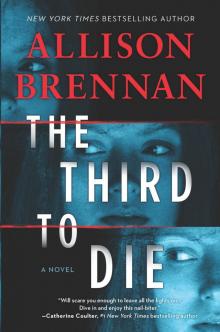 The Third to Die
The Third to Die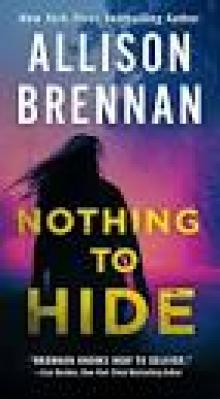 Nothing to Hide
Nothing to Hide No Way Out
No Way Out Cold as Ice
Cold as Ice Cut and Run
Cut and Run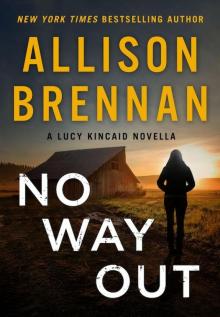 No Way Out (Lucy Kincaid Novels)
No Way Out (Lucy Kincaid Novels) Storm Warning
Storm Warning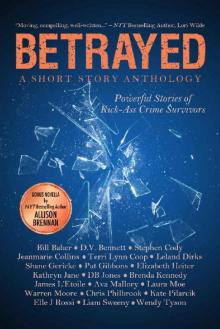 Betrayed: Powerful Stories of Kick-Ass Crime Survivors
Betrayed: Powerful Stories of Kick-Ass Crime Survivors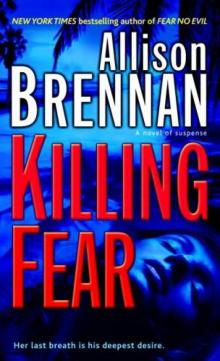 Killing Fear pb-1
Killing Fear pb-1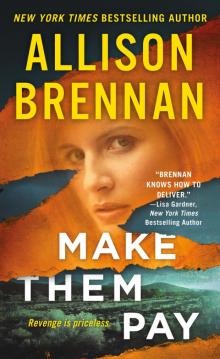 Make Them Pay
Make Them Pay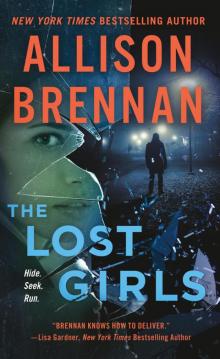 The Lost Girls
The Lost Girls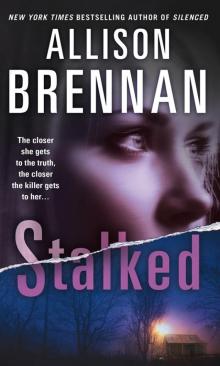 Stalked
Stalked Killing Justice
Killing Justice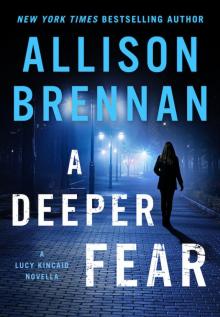 A Deeper Fear
A Deeper Fear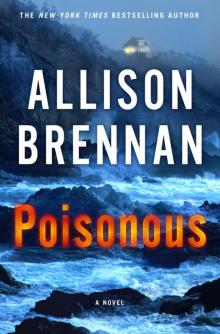 Poisonous
Poisonous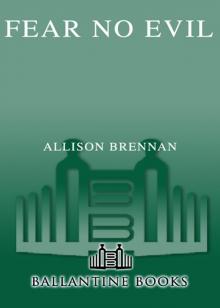 Fear No Evil
Fear No Evil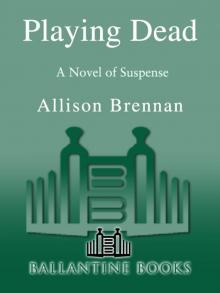 Playing Dead
Playing Dead Cold Snap
Cold Snap Vacation Interrupted
Vacation Interrupted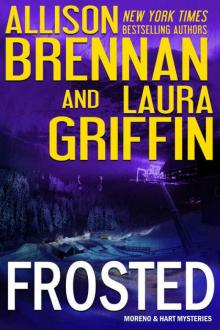 Frosted (Moreno & Hart Mysteries)
Frosted (Moreno & Hart Mysteries)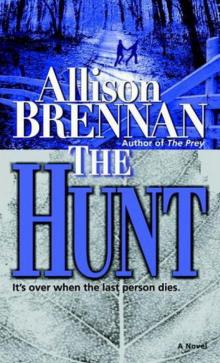 2 - The Hunt
2 - The Hunt Stolen
Stolen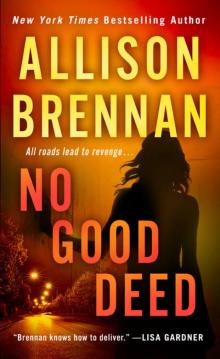 No Good Deed
No Good Deed Cutting Edge
Cutting Edge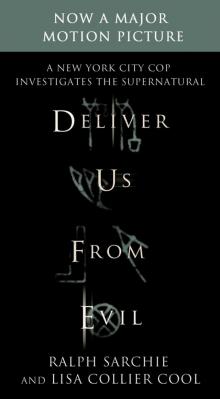 Deliver Us from Evil
Deliver Us from Evil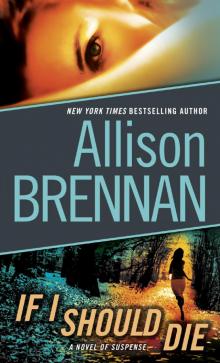 If I Should Die
If I Should Die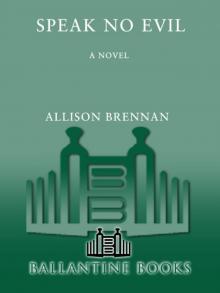 Speak No Evil
Speak No Evil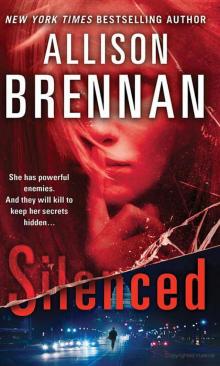 Silenced lk-4
Silenced lk-4 Original Sin sds-1
Original Sin sds-1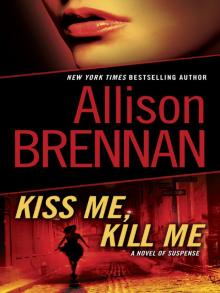 Kiss Me, Kill Me lk-2
Kiss Me, Kill Me lk-2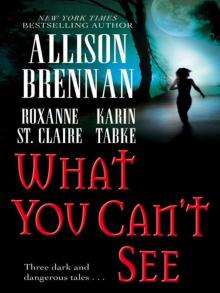 What You Can’t See
What You Can’t See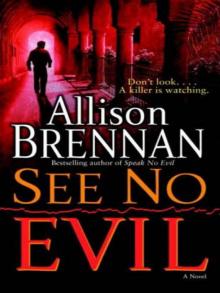 See No Evil
See No Evil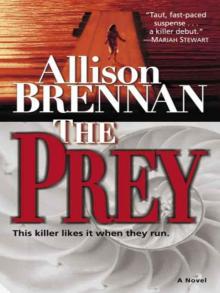 The Prey
The Prey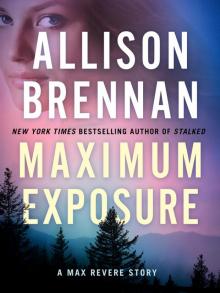 Maximum Exposure
Maximum Exposure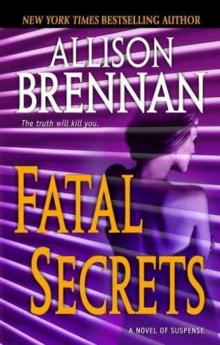 Fatal Secrets f-2
Fatal Secrets f-2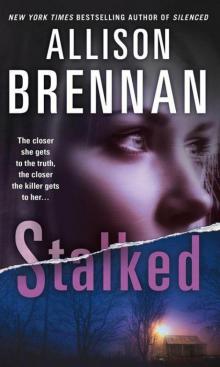 Stalked lk-5
Stalked lk-5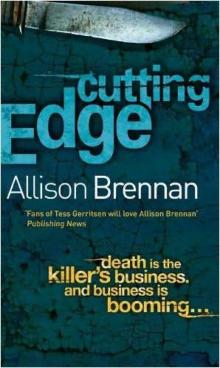 Cutting Edge f-3
Cutting Edge f-3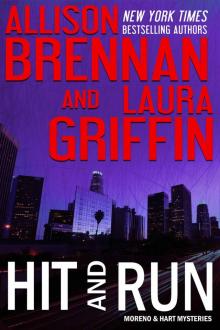 Hit and Run (Moreno & Hart Mysteries)
Hit and Run (Moreno & Hart Mysteries)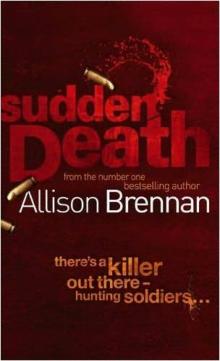 Sudden Death f-1
Sudden Death f-1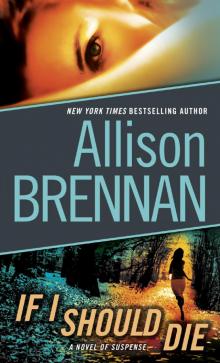 If I Should Die lk-3
If I Should Die lk-3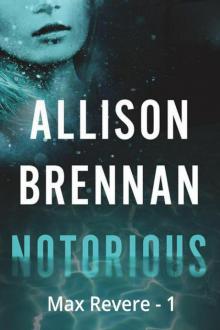 Notorious
Notorious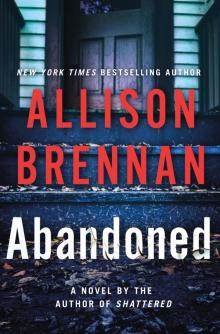 Abandoned
Abandoned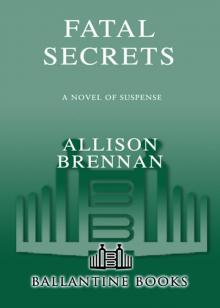 Fatal Secrets
Fatal Secrets The Hunt
The Hunt Carnal Sin sds-2
Carnal Sin sds-2 Love Is Murder
Love Is Murder Lost and Found
Lost and Found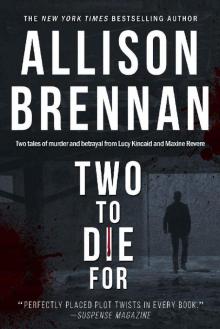 TWO TO DIE FOR
TWO TO DIE FOR Breaking Point
Breaking Point Best Laid Plans
Best Laid Plans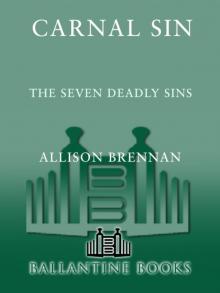 Carnal Sin
Carnal Sin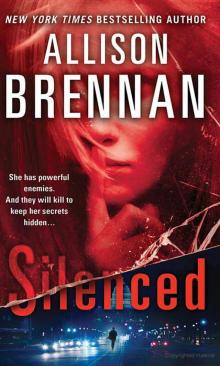 Silenced
Silenced Dead Heat
Dead Heat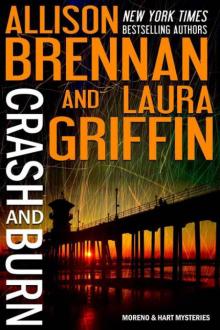 Crash and Burn
Crash and Burn Sudden Death
Sudden Death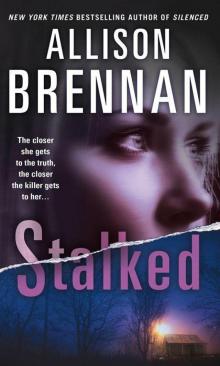 Lucy - 05 - Stalked
Lucy - 05 - Stalked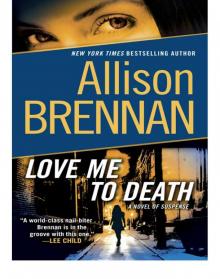 Mortal Sin
Mortal Sin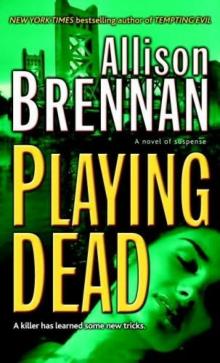 Playing Dead pb-3
Playing Dead pb-3 Kiss Me, Kill Me
Kiss Me, Kill Me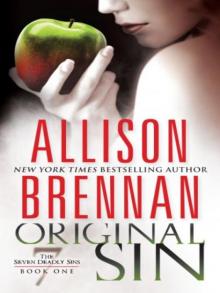 Original Sin: The Seven Deadly Sins
Original Sin: The Seven Deadly Sins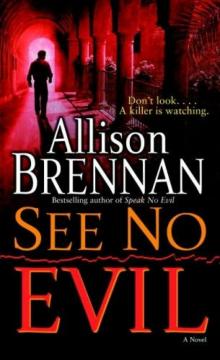 See No Evil e-2
See No Evil e-2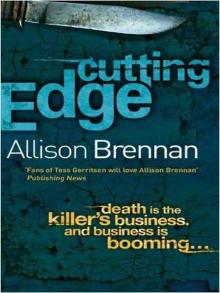 Cutting Edge: A Novel of Suspense
Cutting Edge: A Novel of Suspense Original Sin
Original Sin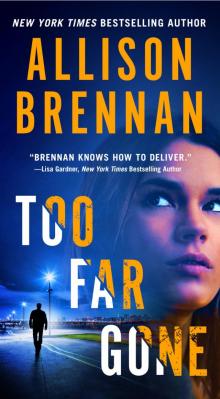 Too Far Gone
Too Far Gone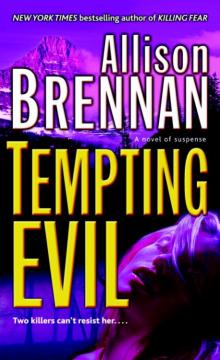 Tempting Evil
Tempting Evil Shattered
Shattered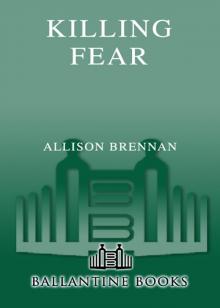 Killing Fear
Killing Fear Murder in the River City
Murder in the River City Love Is Murder (lucy kincaid)
Love Is Murder (lucy kincaid)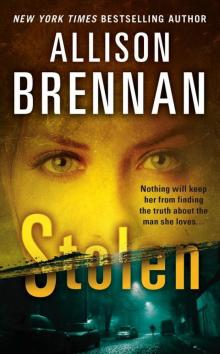 Stolen (Lucy Kincaid Novels)
Stolen (Lucy Kincaid Novels)